Over the past couple of years, the virtual reality trend has been growing, and the demand for VR app development solutions is also increasing. As the majority of mobile phone users have migrated to smartphones and have access to VR-based content, many businesses are looking to develop their own custom apps.
The competition among businesses to stand out in the market is also contributing to the growth of VR app development. With that said, it’s essential first to understand how much it costs to develop a bespoke VR app and understand the process. Before we dive into the core aspects, let’s look at some statistics.
Virtual Reality Statistics:
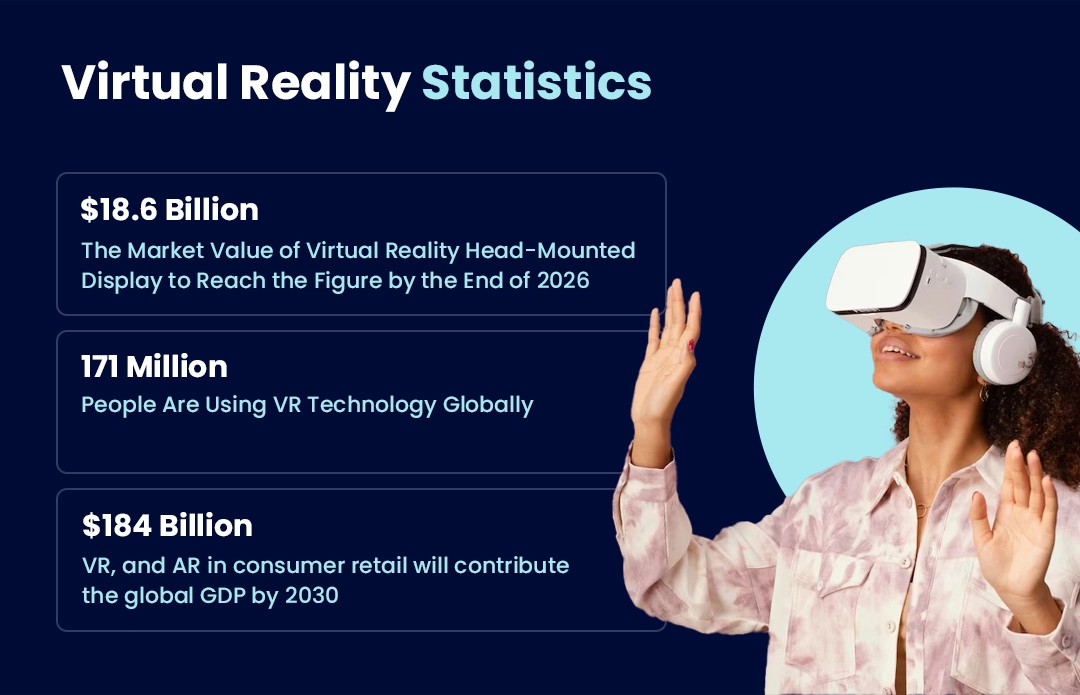
- According to reports, the market value of virtual reality head-mounted displays was around $5.5 billion in 2019, and it’s projected to reach the figure of $18.6 billion by the end of 2026.
- Around 171 million people are using VR technology globally in one form or another, and by 2030, VR will directly impact about 23 million jobs.
- According to PwC, VR, and AR in consumer retail will contribute more than $184 billion to the global GDP by 2030.
Looking at the statistics, it’s clear that the demand for VR is increasing, and as a result, more businesses are opting to develop their own custom apps. On this note, let’s dive into why VR is the future and it’s getting extensively popular.
Why is VR Getting So Popular & Its The Future?
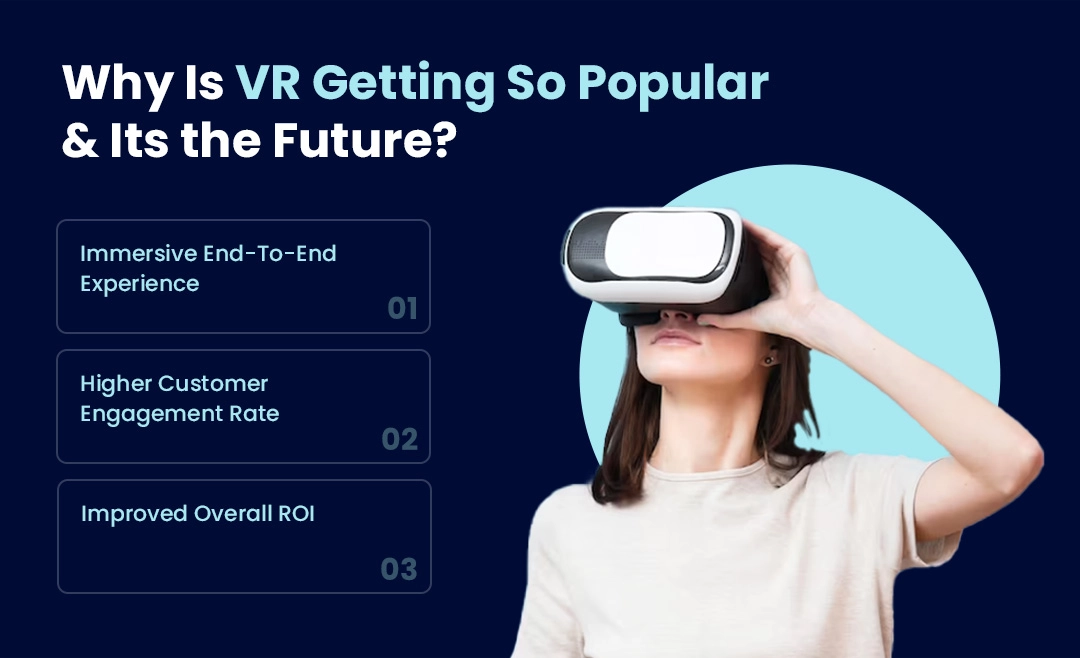
Before you hire the best virtual reality developers, it’s important first to explore the potential and advantages of the technology. Below are some of the key reasons why VR is the future of 2024 and beyond:
Immersive End-to-end Experience:
VR offers an immersive end-to-end experience that is unlike any other. It allows users to explore the environment in a more realistic and engaging way, with the ability to interact with objects, characters, and other elements. Virtual reality also allows users to experience larger contexts than ever before.
Higher Customer Engagement Rate:
VR has a higher customer engagement rate than any other technology. It provides users with an engaging and interactive experience. VR allows for better access to data, which helps marketers reach their target audience more effectively. As it’s highly personalized, enterprises can use it to meet their customers’ needs more efficiently.
Improved Overall ROI:
Professional VR application development services will help improve a company’s overall ROI. VR allows businesses to reach global audiences at a fraction of the cost of traditional marketing methods. VR delivers an unparalleled level of quality and can help increase customer loyalty and satisfaction.
After exploring why it’s future, let’s check out how to develop a custom virtual reality application for your organization and customers.
How To Develop a Custom Virtual Reality Application?
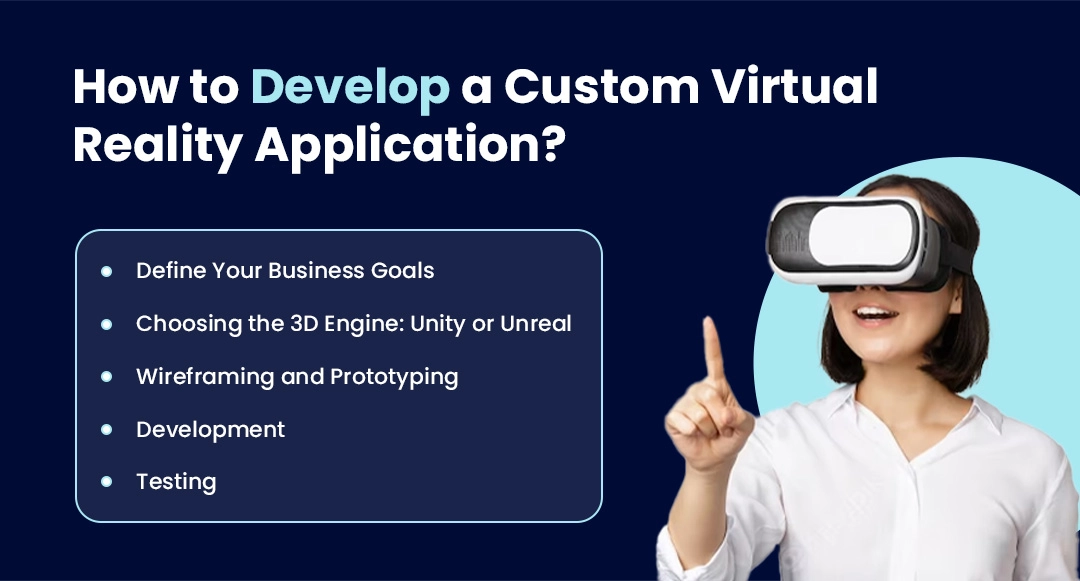
Before you start searching for the best mobile app development agencies for your bespoke VR app development, it’s crucial to understand the process. Below are the key steps that need to be followed when developing a custom VR application.
First, Define Your Business Goals:
Ask yourself why you want to develop a custom VR app for your business. Clearly define what your business goals are and how the application will help you achieve them. Also, identify your target audience and decide the scope of the project.
To ensure you’re covering all the relevant aspects of your app, perform in-depth competitor analysis and research the latest VR trends. This will help you create an effective roadmap for your project. When you have a clear idea of what you want to achieve, it’s time to move on to the next step.
Choosing The 3D Engine: Unity or Unreal:
One of your most crucial decisions is picking the 3D engine – Unity or Unreal. Both options offer great features and robust tools for creating a high-quality VR application. However, depending on your project needs, you may prefer one of these engines. When deciding, consider factors like graphics quality, scalability, performance, and budget.
Consider consulting a professional company while selecting the 3D engine for your project. They can help you make an informed decision and create a detailed architecture for your app from scratch. They will consider multiple things like the type of VR app you want to create, your budget, your target platform, and more.
Wireframing And Prototyping:
Once you have finalized the 3D engine, it’s time to move on to wireframing and prototyping. This helps ensure your app meets all the initial expectations and that it functions correctly in a virtual environment. It allows you to experiment with different designs and ideas without writing any code.
With wireframing and prototyping, you can create a low-fidelity version of your app and review it with stakeholders. After receiving feedback, you can modify the design or make other changes to the prototype. This helps you create a high-quality end product without any issues.

Development:
The next step is to hire the best mobile app developers and start developing your VR app. In the development phase, the developers will use the 3D engine and tools to create your app. They will also consider other considerations, such as interactivity and user experience.
The developers might also use various features such as audio, video, and animations to enhance the user experience. They will ensure that your app works seamlessly across all VR platforms, including Oculus Rift, HTC Vive, and others.
Testing:
Once the development process is complete, you need to test your app rigorously. This helps identify any potential issues that may arise and make sure the users get a smooth experience. You should also perform usability testing to ensure that your app meets user expectations.
The testing phase is a crucial part of any VR development project and should not be overlooked. It’s essential to ensure that your app meets the highest quality standards before it is released on the market.
After exploring the development process, now have a look at how much VR application development will cost your company.
What Is The Process Of Creating a VR App?
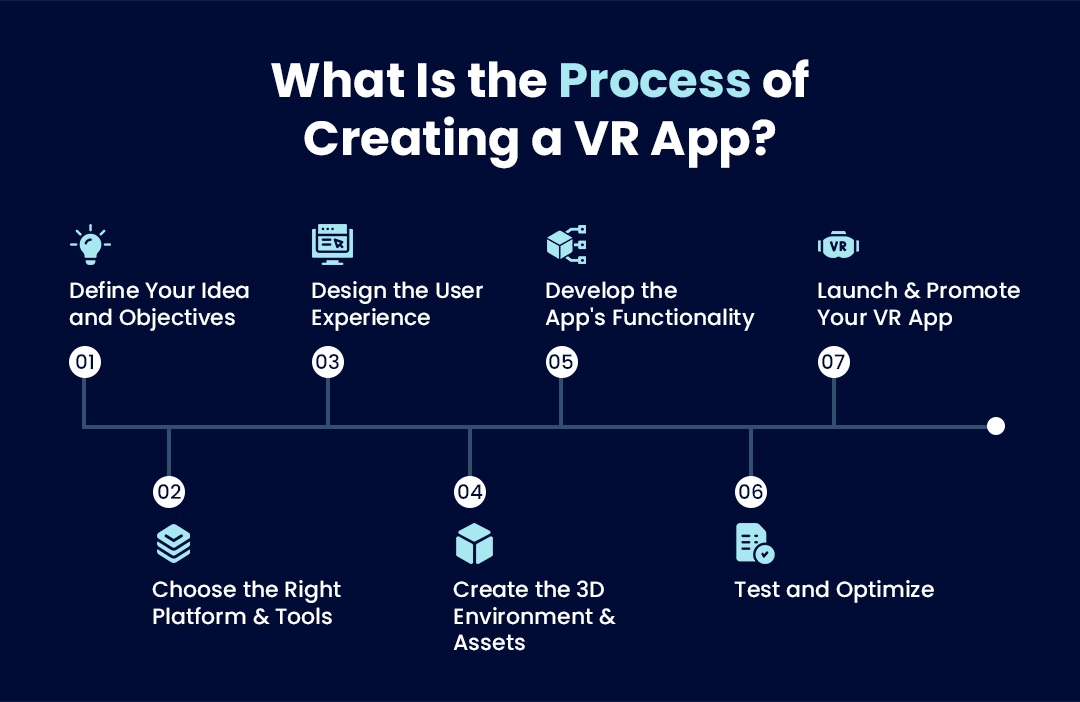
Developing a VR app can be both challenging and rewarding, involving a series of intricate steps. Here’s a step-by-step guide to help you navigate the process of creating your own VR app.
Define Your Idea and Objectives:
Before diving into development, take a moment to crystallize your vision. What are the goals of your VR app? Who is your target audience? Answering these questions will give you a clear direction and help you make informed decisions throughout development.
Choose the Right Platform and Tools:
Several VR platforms exist, each with its unique features and user base. Popular options include Oculus Rift, HTC Vive, PlayStation VR, and Google Cardboard. When choosing a platform, consider your target audience, budget, and technical requirements. Once you’ve selected a platform, explore the various development tools available. Unity and Unreal Engine are famous for building VR experiences, offering robust features and extensive documentation.
Design the User Experience:
VR apps require careful consideration of user experience (UX) design. Unlike traditional apps, VR apps involve a three-dimensional environment that users can physically explore. Ensure your app offers intuitive navigation, comfortable motion, and engaging interactions.
Create the 3D Environment and Assets:
Now it’s time to bring your VR world to life. Design the 3D environment, including landscapes, buildings, and objects. Use modeling software like Blender or Maya to create realistic assets and optimize them for performance on your chosen platform.
Develop the App’s Functionality:
You can develop the app’s core functionality with your environment and assets in place. This may involve coding interactions, integrating physics, or incorporating artificial intelligence. Be prepared to iterate and refine your app’s features throughout development.
Test and Optimize:
Thoroughly testing your VR app is crucial to ensure a smooth user experience. Identify any performance issues, bugs, or usability concerns, and make necessary adjustments. Don’t forget to test on multiple devices and platforms to guarantee compatibility.

Launch and Promote Your VR App:
Once you’re satisfied with your app’s performance and functionality, it’s time to share it with the world. Submit your app to the relevant VR app stores, and promote it through social media, content marketing, and other channels. Collect user feedback to make future improvements and keep your app fresh and engaging.
How Much Does It Cost To Build a Custom VR Application?
This is a question that many businesses are asking these days, and the answer depends on a variety of factors. Generally speaking, the cost to build a custom VR app or VR game varies greatly depending on the complexity and scope of the project.
On average, the cost to build a custom virtual reality application will range between $30,000 to $150,000. However, the exact cost will depend on the number of features, platforms, and device types it needs to be compatible with. The more complex the project, the higher the final development cost. On this note, let’s have a look at factors affecting the overall cost of building your VR app.
Factors Affecting The Cost of VR Application Development:
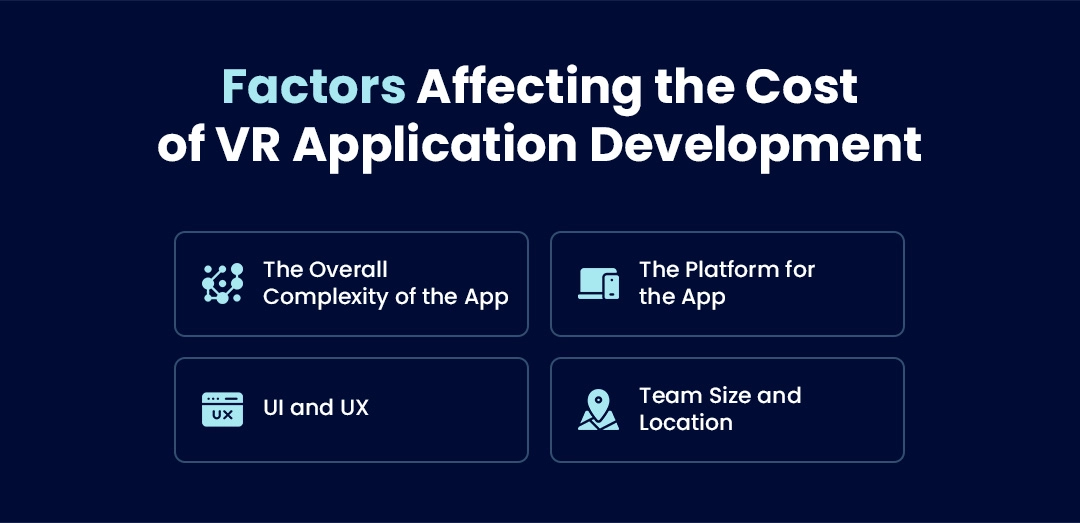
The Overall Complexity Of The App:
The key factor that affects the cost of VR application development is the complexity of the app. Complex features like 3D modeling, interactive user interface, online multiplayer capabilities, etc., require more time and resources for development and will therefore increase the cost of the app.
In addition, the complexity of the app can also have an effect on the time it takes to develop. If you are looking to create a complex app with more features, you can expect the development time to take longer.
The Platform For The App:
The virtual reality platform that you choose for your application will also affect the cost of development. Different platforms have different levels of sophistication, which can influence the amount of resources needed to develop and maintain the application.
For example, developing an application for a platform like Oculus Rift will require more resources than developing it for a simpler platform such as Google Cardboard. Moreover, it’s also important to decide whether you want to build a native or hybrid app. Based on your requirements, hire the best mobile application development company like AGS.
UI and UX:
The user interface (UI) and user experience (UX) of a VR application can also affect the cost. The design of the UI should be intuitive, engaging, and easy to navigate, while UX encompasses the overall look and feel of the app.
If you want to create an app that stands out from the competition, it’s important to pay close attention to UI and UX design. A team of experienced designers will be able to create an engaging and aesthetically pleasing experience that can be tailored to your specific needs.

Team Size And Location:
The size of your development team will also play an important role in determining the cost of VR application development. A larger team with more experienced and qualified developers will undoubtedly cost more. However, this may be justified if the application requires multiple features or is expected to have a large user base.
In addition, the location of the development team can also influence the cost, with teams in certain regions typically costing more than those located in other areas. For instance, developers in the United States are usually more expensive than those based in India or Eastern Europe.
Now, let’s explore some key monetization strategies for VR so that companies can quickly generate a steady flow of revenue.
Monetization Strategies For Your Custom Virtual Reality App:
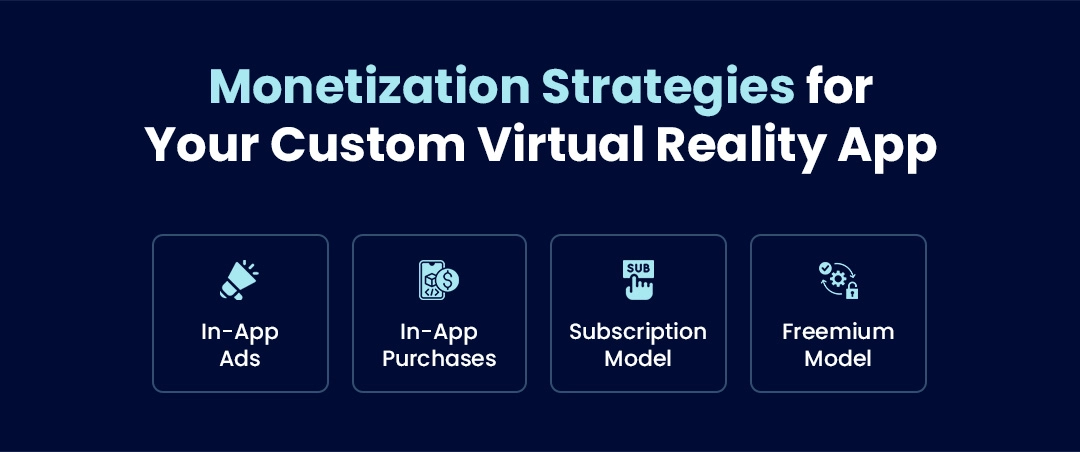
In-app Ads:
Advertising is the most common monetization method used in mobile apps. While it can be less lucrative than some other monetization strategies, they offer a low-risk, low-maintenance way of generating revenue from an app. Ads can be targeted to users based on their in-app activity and demographics, increasing the likelihood of them being interested in the ad.
In-app Purchases:
In-app purchases, or IAPs, are a great way to monetize your virtual reality app. You can offer users additional content, power-ups, or other virtual goods in exchange for real money. This is a great way to generate recurring revenue, as users can be enticed to purchase more items frequently.
Subscription Model:
The subscription model is rapidly gaining traction among app developers. Subscriptions allow users to pay a one-time or recurring fee in order to access premium features or content within your app. This model can be incredibly lucrative, as users are willing to pay for access to extra features or content.
Freemium Model:
The freemium model is a great way to monetize your virtual reality app. The idea is to offer basic features and content for free while charging users for access to additional content or features. This allows users to try out the app and get a taste of the features it has to offer while giving you an opportunity to upsell them on more advanced features.
It’s important to hire an experienced company like Auxano Global Services that can effectively implement and manage the monetization strategies for your virtual reality app.
How to Choose the Right Virtual Reality Mobile App Developer?
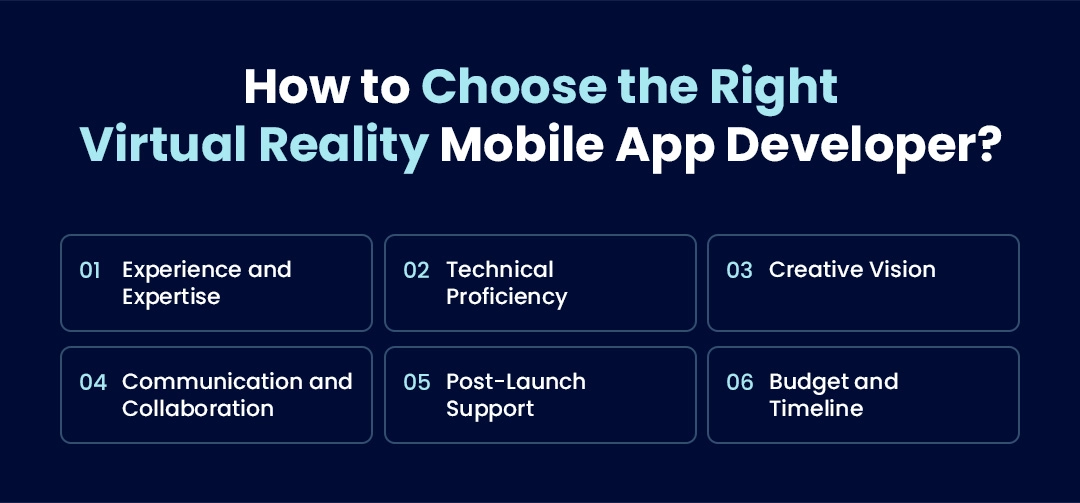
Experience and Expertise:
First and foremost, consider the experience and expertise of the potential developers. Have they worked on similar projects before? Explore their portfolio to gauge their understanding of the VR landscape. Don’t hesitate to request case studies or ask about their challenges in past projects. The more experienced the developer, the better equipped they’ll be in handling complexities.
Technical Proficiency:
VR development demands a unique blend of skills, including programming languages, game engines, and 3D modeling. Make sure your chosen developer has proficiency in these areas. Familiarity with platforms like Unity, Unreal Engine, and tools like Blender or Maya is necessary. Additionally, look for expertise in SDKs specific to your target platforms, such as Google Cardboard or Oculus.
Creative Vision:
A great VR app requires more than technical prowess and a strong creative vision. Seek developers who can think outside the box, push boundaries, and bring fresh ideas. When reviewing their previous work, consider the app’s design, storytelling, and overall user experience.
Communication and Collaboration:
Effective communication is crucial during the development process. Ensure that your chosen developer values open dialogue and is receptive to feedback. They should be willing to collaborate, share updates regularly, and be transparent about progress. A developer who communicates well will make the entire process smoother and more enjoyable.
Post-Launch Support:
Once your VR app is live, it’s essential to have a developer who offers post-launch support. This includes bug fixes, updates, and potential improvements to keep your app relevant and engaging. Confirm that your developer is committed to providing ongoing maintenance and support.
Budget and Timeline:
Last but not least, discuss your budget and timeline expectations with potential developers. Find a partner who can deliver high-quality work within your constraints. Remember that the cheapest option may not always be the best—balance affordability and quality.
Why Hire Auxano Global Services For VR App Development?
Auxano Global Services is a leading VR app development company with experience in developing virtual reality apps. Our team of experienced developers has the skills and expertise to create a custom VR experience tailored to your specific needs.
We can help you develop an app that is engaging and easy to use while also helping you to monetize the app effectively. With our comprehensive services, you can be sure that your VR app will be a success and generate a steady revenue stream.
Wrapping up!
Virtual reality is the future of technology, and VR apps are becoming increasingly popular. Businesses can leverage the potential of VR by developing and monetizing their own apps. It is important to partner with an experienced app development company like Auxano Global Services that can help you create a unique and engaging VR experience tailored to your specific requirements. Coming to the cost to develop a VR app, depends on the complexity of the project. On average, you can expect to pay somewhere between $30k-$150k to develop a high-quality VR app.
Frequently Asked Questions
-
1. Why will VR remain relevant?
VR will remain relevant as it offers a unique and immersive experience that can’t be replicated in other mediums. With the advancement of technology, VR is becoming increasingly more accessible and affordable.
-
2. What should be kept in mind while developing a VR app?
When developing a VR app, there are several key factors to consider. These include the complexity of the app, the size of the development team, and the monetization strategies that will be used.
-
3. How much does it cost to develop a VR app?
The cost of developing a VR app can vary significantly depending on multiple factors like features, complexity, and more. On average, it costs around $30,000 to $150,000.
-
4. How long does it take to develop a VR app?
The timeline of a VR app development project can vary depending on factors like app size, team, budget, and many other factors. Generally, it takes around 3 to 6 months to develop a full-fledged VR app.
-
5. Which industries are using VR technology?
VR is being used in a variety of industries, including healthcare, education, hospitality, entertainment, and more, as the possibilities are endless with VR technology.



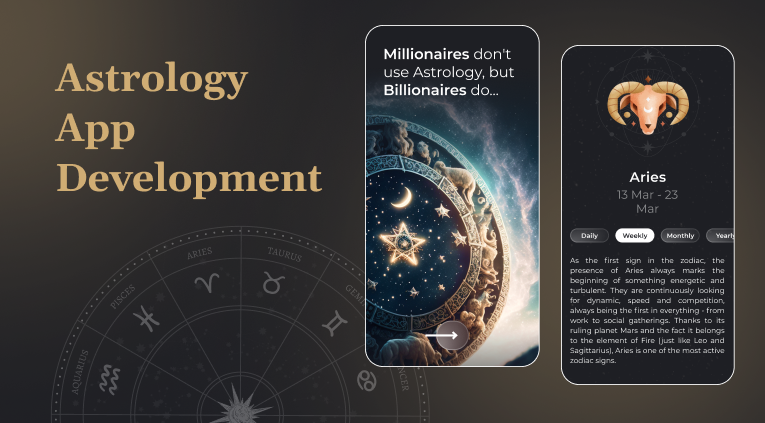

![Angular Vs. Rеact: What to Choose For Your Blockchain App? [2024]](https://www.auxanoglobalservices.com/agsresources/wp-content/uploads/2023/11/Front.png)
